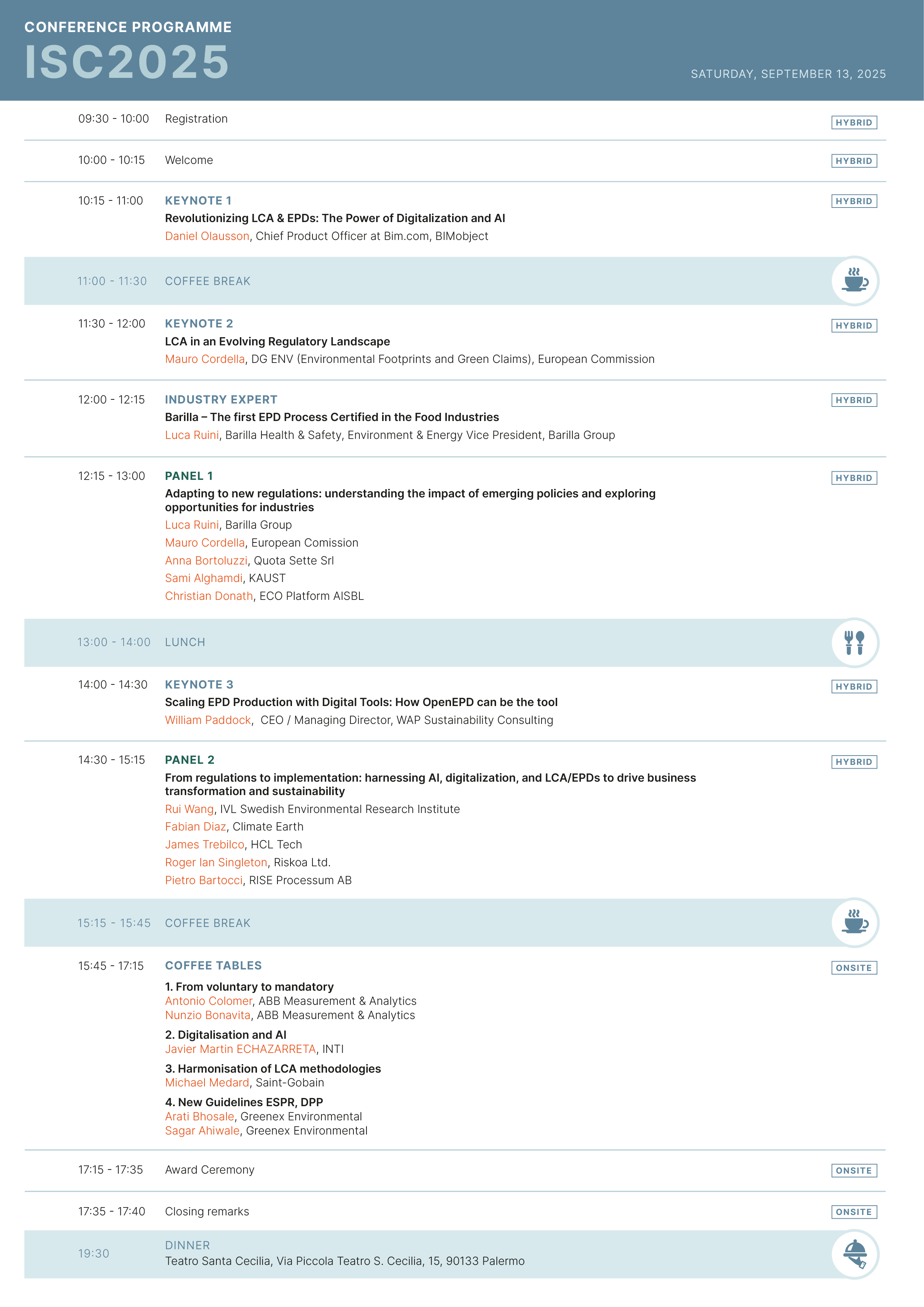Agenda
Session Descriptions
Below is the description of sessions at ISC2025, whereas information about the speakers can be found on ISC2025 Speakers.
Keynote 1: Revolutionising LCA & EPDs: the Power of Digitalisation and AI
How will the future of sustainability reporting look like? How can AI play a role in sustainable reporting? Daniel Olausson, Chief Product Officer at BIMObject, will present an inspiring session on how AI is transforming sustainability reporting.
With AI-driven capabilities, data collection becomes more efficient, reporting is streamlined, and businesses can stay ahead of evolving regulations. Intelligent automation and advanced solutions streamline the entire EPD development process, enhancing credibility and enabling scalability. Learn how automation and smart algorithms can optimise every stage of the EPD development — from data collection and simulation to verification, reporting, and final publication.
Keynote 2: LCA in an Evolving Regulatory Landscape
As industries face an ever-changing regulatory environment, understanding and navigating new environmental policies has become critical for businesses striving to remain compliant and competitive. This keynote will delve into the use of life cycle thinking and related tools in EU policies and market initiatives, such as Ecodesign for Sustainable Products Regulation (ESPR), Construction Products Regulation (CPR), Product Environmental Footprint Category Rules (PEFCRs). Implications for industry and linked tools, e.g. the Carbon Boarder Adjustment Mechanism, will be discussed, as well as key challenges ahead to ensure life cycle approaches are coherently applied at scale to inform sound policy and business decisions supporting the transition to sustainability.
Keynote 3: Scaling EPD Development with Digital Tools: How OpenEPD Can Drive the Needed Change
Standardising LCA methodologies globally for EPD development is essential to ensure credibility, consistency, and comparability of EPDs. As the demand for EPDs increases, so does the complexity of developing them—ranging from product-specific to batch-specific, from semi-automated to fully automated, and from facility-average to just-in-time EPDs.
To effectively scale EPD development, innovation that stays rooted in core principles need to be in place: globally harmonised digital formats, trustworthy verification processes, and workflow tools that support consistent and high-quality output.
In this keynote, William Paddock will share how OpenEPD is being used for LCA methodology harmonisation and for scalable and credible EPD development—highlighting the importance of tool and process verification, and showcasing how digitalisation can support, not replace, the fundamental principles of standardisation.
Panel 1: Adapting to New Regulations
With the introduction of stringent environmental policies, businesses are required to adapt rapidly to avoid penalties and to capitalise on regulatory advantages. This panel will bring together industry leaders, policymakers, and experts to examine the far-reaching effects of emerging regulations across industries. They will explore how businesses can leverage their compliance with new regulations as opportunities for growth, innovation, and environmental leadership. The discussion will cover strategies for staying ahead of the curve, responding to regulatory changes, and integrating sustainability into business models that are both environmentally and economically sustainable.
Panel 2: From Regulations to Implementation
As the global regulatory landscape becomes more complex and transparency requirements on environmental reporting will only increase, corporations must move beyond simple compliance and focus on smart and effective adoption of (AI-supported) digital LCA/EPD tools and LCA/EPD practices that can drive business transformation at scale whilst supporting sustainability goals.
This panel will feature a diverse range of experts who will discuss the practicalities of turning regulatory requirements into actionable steps for businesses. Topics will include the use of AI and digital platforms in the implementation of LCA/EPD systems, as well as how businesses can adopt these technologies to enhance operational efficiency, reduce environmental impact, and align with global sustainability standards.
Industry Expert: Barilla – The first EPD Process Certified in the Food Industries
Barilla began measuring and reducing the environmental impact of its products in the early 2000s, adopting the Life Cycle Assessment (LCA) methodology based on European Life Cycle Thinking.
As a forerunner in tracking its product impacts, Barilla published its first Environmental Product Declaration (EPD) in 2009, and , launched the first EPD Management System in the food industry in 2010, guided by the LCA method and the Product Category Rules (PCR) and certified by third-party verification. This approach aimed both to identify opportunities for improvement across the supply chain, and to communicate product environmental performance through a certified process.
Today, over 80 EPDs have been published and verified, covering around 70% of product volumes sold, reflecting Barilla's long-standing commitment to sustainability and acknowledging the contributions of partners across the supply chain.
Coffee Table Workshops
A dynamic opportunity for participants to engage with experts in small, interactive discussions around specific, relevant topics. When registering for the conference, attendees will select their preferred topics from three distinct discussion themes. Based on the choices, participants will be assigned to two of these selected topics, ensuring insightful and engaging exchanges.
Each discussion will be facilitated by an expert in the field, encouraging open dialogue and allowing participants to share real-world case studies, challenges, and best practices. This format promotes peer learning and deepens understanding of key issues related to EPD development, emerging regulations, digital tools, and industry trends.
These sessions offer a unique opportunity to dive into pressing topics in the ecosystem with professionals from diverse backgrounds and roles. It’s an invaluable chance to connect, collaborate, and learn from others in a more in-depth setting.
Topics:
1. From voluntary to mandatory
2. Digitalisation and AI
3. Harmonisation of LCA methodologies
